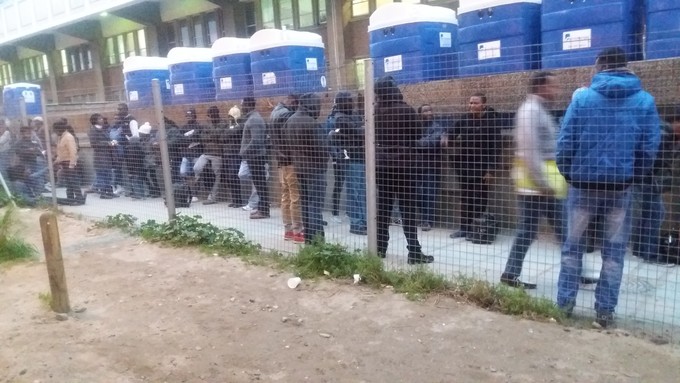Broken Home Affairs system leaves refugees stranded
It has been down for two weeks, and no one can say when it will be fixed
The Home Affairs database system that manages refugee and asylum documentation has been down for almost two weeks across the country. Refugees have described their frustration with poor communication from officials, standing in long queues, and being blocked from doing anything that South African citizens use an identity document to access.
A week ago, GroundUp described the story of a refugee who cannot access her bank account because she cannot renew her refugee documents, and is on the brink of being fired because she has queued for days at the Home Affairs building on Cape Town’s foreshore. Hundreds of refugees in a similar position to her were being turned away everyday this week. On Thursday about 500 people were turned away at the Cape Town office at about 8:30am. Many had been queuing since 6am or 7am.
Moreover, the national department has failed to respond to GroundUp’s emails, telephone calls and text messages since last week. (See The worst spokesman in government?)
No one has been able to tell us what is wrong with the system. On Wednesday a Cape Town Home Affairs official who identified himself as George said he doesn’t know when the system will be fixed. “The main server is offline and they are working on it. It needs replacement and it’s not just our offices … Port Elizabeth and Marabastad offices are offline as well,” he said.
An official at the reception of the Port Elizabeth Home Affairs office said that the system has not been working since Tuesday.
The Secretary General of the Somali Association in South Africa, Mohammed Kat, said his office in Korsten was overwhelmed by people seeking clarity on the shutdown. He said that their members were scared. “The Department of Home Affairs is not telling us what happened. They are only extending the permits manually, a process that we feel banks and other stakeholders will not accept. The main concern is the silence on the part of the department.”
Abdul Olatunji of Community of African Nations in South Africa (CANiSA) said, “Our concern is whether [Home Affairs] informed the law enforcing sector. We fear that innocent foreigners will end up getting arrested for failing to produce valid papers. There is also the issue of banks and employers. Most banks do not allow handwritten documents in their systems. We are closely watching the situation.We will not tolerate a situation where one of us will either be arrested or victimised at their workplace or banks because of the department’s technical glitch.”
At the Cape Town office, a Burundian man who drives a metre taxi said his main worry is traffic cops. They usually want him to produce his ID and his driver’s license. He intended to go to a police station to sign an affidavit that he hoped could be used temporarily in place of his ID. “You can see by the way the Home Affairs official spoke to us that he does not care. He gave a fun face, when we asked what we are going to tell police. He forgets that if there are no refugees, there is no job for him,” he said.
A Zimbabwean woman from Wellington, who does seasonal work on farms, said she and her three children had to wake up at 2am and walk to the train station to take the first train to Cape Town where she renews her asylum papers every three months. She had been to Home Affairs last week, and was told to come back on 2 June. Today her nine- year-old girl missed a school examination because she had to bring her to Home Affairs to renew her documents. “The past two weeks had been hard for me. When my asylum document expired, my employer temporarily stopped me working. I need to borrow money from friends for transport to commute to Home Affairs since I haven’t been working,” she said.
“My rent and children’s school fees are overdue. My family is living on handouts. When I told my boss about the offline system he said he needs proof from Home Affairs that the system is offline because he does not want to get in trouble.”
Support independent journalism
Donate using Payfast

Don't miss out on the latest news
We respect your privacy, and promise we won't spam you.
© 2016 GroundUp. 
This article is licensed under a Creative Commons Attribution-NoDerivatives 4.0 International License.
You may republish this article, so long as you credit the authors and GroundUp, and do not change the text. Please include a link back to the original article.

